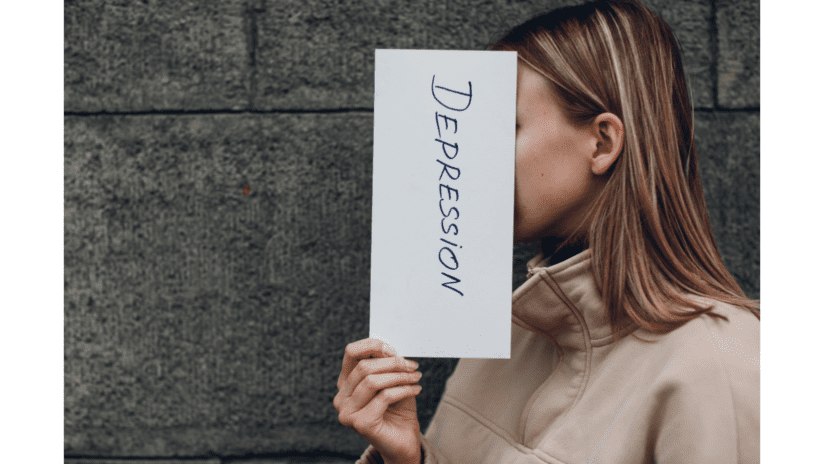Uncovering the Roots of Depression: A Comprehensive Exploration
Introduction
Depression is a complex and pervasive mental health condition that affects millions of people worldwide. While it’s often viewed as an emotional state, the roots of depression run deep, intertwining genetics, life experiences, and brain chemistry. In this article,Uncovering The Roots of Depress we’ll embark on a journey to uncover the intricate web of factors contributing to depression. By delving into its origins, we hope to shed light on this enigmatic condition and provide valuable insights for those seeking a deeper understanding.
Table of Contents
What Is Depression?

Before we dive into Uncovering The roots of depression, it’s essential to establish a clear understanding of what depression is. Depression is not just occasional sadness; it’s a persistent and often deovering bilitating mood disorder characterized by feelings of sadness, hopelessness, and a loss of interest in activities once enjoyed. It can affect every aspect of a person’s life, from their relationships to their physical health.
Causes of Depression: Uncovering The Roots of Depression
1.Genetics: The Predisposition Factor
The Genetic Link
Genetics plays a significant role in the development of depression. Studies have shown that individuals with a family history of depression are at a higher risk of experiencing it themselves. While specific genes have been identified as potential contributors, the interplay between genetics and environmental factors remains complex.
Epigenetics: A New Frontier
Epigenetics, the study of changes in gene expression, has unveiled a fascinating aspect of depression’s roots. Environmental factors such as stress, trauma, and even diet can influence gene expression, potentially increasing the risk of depression. Understanding these epigenetic changes may offer new avenues for treatment and prevention.
2.Brain Chemistry: The Neurotransmitter Imbalance

The Role of Neurotransmitters
Depression is often associated with an imbalance in neurotransmitters, the chemical messengers in our brains. Serotonin, dopamine, and norepinephrine are among the key players. When these neurotransmitters are out of balance, it can lead to mood disturbances and depressive symptoms.
The Impact of Stress
Chronic stress can disrupt the delicate balance of neurotransmitters, contributing to depression. The body’s “fight or flight” response, designed to handle acute stress, can become overactive in the face of chronic stressors. This hyperactivity can lead to persistent feelings of anxiety and sadness.
3.Life Experiences: Nurturing Depression
Childhood Trauma
Childhood experiences, especially traumatic ones, can cast long shadows on mental health. Childhood trauma, such as abuse or neglect, can significantly increase the risk of developing depression in adulthood. Recognizing and addressing these past experiences is a crucial step in the healing process.
Social Isolation
In our increasingly connected yet isolating world, social isolation has become a significant contributor to depression. Humans are inherently social beings, and lack of social interaction can lead to feelings of loneliness and despair. Understanding the importance of social connections is vital in combating depression.
4.Lifestyle Factors: Nurturing Resilience
The Impact of Diet
The saying “you are what you eat” holds true when exploring the roots of depression. Nutrient deficiencies, particularly in essential vitamins and minerals, can exacerbate depressive symptoms. A balanced diet rich in nutrients can support mental well-being.
Exercise as Medicine
Physical activity is a potent antidote to depression. People who lives sedentery life are more prine to depression.Regular exercise has been shown to release endorphins, the body’s natural mood lifters. It also promotes better sleep and reduces stress, all of which play crucial roles in depression management. Lack of exercise also leads to depressive life.
5.Cultural and Socioeconomic Influences
Cultural Perspectives
It’s crucial to recognize that the experience and perception of depression can vary across cultures. Cultural norms, beliefs, and stigmas can impact how individuals express and seek help for their depressive symptoms. Understanding these cultural nuances is essential for effective treatment and support.
Socioeconomic Factors
Socioeconomic status can also play a significant role in the development and persistence of depression. Limited access to healthcare, educational opportunities, and economic hardships can create a breeding ground for depressive symptoms. Addressing these socioeconomic disparities is vital for holistic mental health care.
6.Technology and Social Media: Uncovering The Roots of Depression
The Digital Age Dilemma
The advent of the digital age has brought both advantages and challenges in the context of depression. While technology offers convenient access to information and support, it can also contribute to feelings of isolation, cyberbullying, and the “social comparison” trap. Understanding how to navigate the digital landscape safely is essential for mental well-being.
The Impact of Social Media
Social media plays an important role in Uncovering The Roots of Depression.Social media platforms can amplify the symptoms of depression by fostering unrealistic expectations and promoting a curated, idealized version of life. Recognizing the potential negative impact of excessive social media use is crucial for mental health preservation.
7.Childhood Factors Revisited
Parental Influence
Parental behaviors and upbringing can significantly influence a child’s vulnerability to depression. A nurturing and supportive environment can mitigate risks, while neglect or abuse can heighten them. Parental awareness and involvement in a child’s emotional development are critical.
Early Intervention
Recognizing depressive symptoms in children and adolescents is essential for early intervention. Effective treatment and support during childhood can reduce the long-term impact of depression and improve overall well-being.
The Path Forward
Uncovering the roots of depression is an evolving process that demands a multifaceted approach. By acknowledging the intricate interplay of genetics, life experiences, socioeconomic factors, and cultural influences, we can better understand and address this complex condition. Remember, if you or someone you know is dealing with depression, reaching out for help and support is a courageous step.
Common Symptoms of Depression
1. Persistent Sadness
One of the hallmark symptoms of depression is a pervasive sense of sadness that lingers for weeks or months. This sadness is not linked to a specific event and may seem unexplainable to the individual experiencing it.
2. Loss of Interest or Pleasure
People with depression often lose interest in activities they once enjoyed. Hobbies, socializing, and even spending time with loved ones can become unappealing or overwhelming.
3. Changes in Appetite and Weight
Depression can lead to significant changes in eating habits. Some individuals may experience a loss of appetite and weight loss, while others may turn to food for comfort, resulting in weight gain.
4. Sleep Disturbances
Sleep problems are common in depression. Insomnia or oversleeping can occur, making it challenging to maintain a regular sleep schedule.
5. Fatigue and Low Energy
Individuals with depression often feel persistently tired, even after a full night’s sleep. This fatigue can make daily tasks feel like monumental challenges.
6. Difficulty Concentrating
Depression can impair cognitive function, leading to difficulties in concentrating, making decisions, and remembering things.
7. Feelings of Worthlessness or Guilt
Many people with depression experience overwhelming feelings of worthlessness or excessive guilt, often without a rational basis.
8. Physical Symptoms
Depression isn’t limited to emotional symptoms. It can manifest physically, leading to headaches, digestive issues, and unexplained aches and pains.
When to Seek Help

Uncovering The Roots of Depression and Recognizing the symptoms of depression is the first step toward seeking help. If you or someone you know is experiencing several of these symptoms for an extended period, it’s crucial to reach out to a healthcare professional for Counselling. Depression is treatable, and early intervention can significantly improve outcomes.
Conclusion
Uncovering the roots of depression is an ongoing journey, marked by both scientific discoveries and personal revelations. By understanding the complex interplay of genetics, brain chemistry, life experiences, and lifestyle factors, we can approach depression with compassion and knowledge. Remember, if you or someone you know is struggling with depression, seeking help is a courageous step towards healing.In conclusion, our understanding of the roots of depression continues to evolve as we uncover new factors that contribute to this complex condition. By addressing these multifaceted influences and promoting open dialogue, we can work towards a society that is more compassionate and equipped to support those affected by depression.
FAQs – Uncovering the Roots of Depression
- Is depression purely a result of genetics? Depression has genetic components, but it’s influenced by a combination of genetic, environmental, and lifestyle factors.
- Can childhood trauma cause depression later in life? Yes, childhood trauma can increase the risk of developing depression in adulthood, but it’s not the sole determinant.
- How can I support someone struggling with depression? Offering empathy, a listening ear, and encouraging them to seek professional help are valuable ways to support a loved one with depression.
- Is medication the only treatment for depression? No, there are various treatments for depression, including Psychotherapy, lifestyle changes, and medication. The most effective approach depends on individual circumstances.
- What role does self-care play in managing depression? Self-care, including proper nutrition, exercise, and stress management, is crucial in managing and preventing depression.
- How can I help reduce the stigma around depression in my community? You can help by openly discussing mental health, educating others, and supporting initiatives that promote mental health awareness and acceptance.
- Are there specific cultural therapies or practices that can help with depression? Yes, some cultures have traditional healing practices that can complement conventional therapies. It’s essential to consult with a culturally sensitive mental health professional.
- Can depression affect physical health? Yes, depression can have a significant impact on physical health, increasing the risk of various medical conditions. Treating depression can improve overall well-being.
- What can I do if I can’t afford professional treatment for depression? Look for community mental health resources, sliding-scale clinics, or support groups. Many organizations offer free or low-cost mental health services.
- How can I support a friend or family member with depression without overstepping boundaries? Offer your support and encourage them to seek professional help, but respect their decisions and boundaries. Simply being there to listen and show empathy can make a difference.
Check my links:
My Facebook page: https://www.facebook.com/pwcc38/
My Instagram: https://www.instagram.com/positiveworld2632/
My Linkedin Account: https://in.linkedin.com/in/sarita-saini-31150017
My website: http://www.positiveworldcounselling.com

